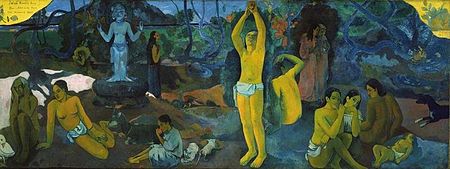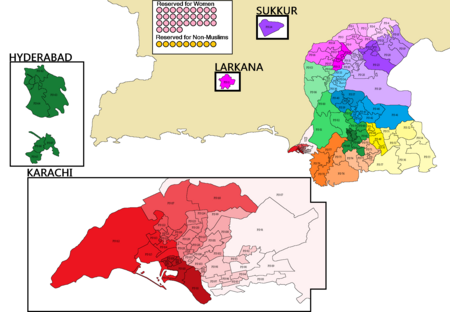Lü Guang
| |||||||||||||||||||||||||||||||||||||||||||||||||
Read other articles:

Village development committee in Bheri Zone, NepalRokayagaun रोकायागाउँVillage development committeeRokayagaunLocation in NepalCoordinates: 29°01′N 82°11′E / 29.02°N 82.18°E / 29.02; 82.18Country NepalZoneBheri ZoneDistrictJajarkot DistrictPopulation (1991) • Total2,364Time zoneUTC+5:45 (Nepal Time) Rokayagaun is a former village development committee in Jajarkot District in the Karnali Province of Nepal. At th…

American television producer Rod RoddenberryRoddenberry in 2017BornEugene Wesley Roddenberry Jr. (1974-02-05) February 5, 1974 (age 50)Los Angeles, California, U.S.Alma materHampshire CollegeOccupationTelevision producerSpouse Heidi Roddenberry (m. 2002)Children1ParentsGene Roddenberry (father)Majel Barrett (mother) Eugene Wesley Rod Roddenberry Jr. (born February 5, 1974)[1] is an American television producer and the chief executive officer of Ro…
2020年夏季奥林匹克运动会波兰代表團波兰国旗IOC編碼POLNOC波蘭奧林匹克委員會網站olimpijski.pl(英文)(波兰文)2020年夏季奥林匹克运动会(東京)2021年7月23日至8月8日(受2019冠状病毒病疫情影响推迟,但仍保留原定名称)運動員206參賽項目24个大项旗手开幕式:帕维尔·科热尼奥夫斯基(游泳)和马娅·沃什乔夫斯卡(自行车)[1]闭幕式:卡罗利娜·纳亚(皮划艇)[2…

Indian drama television series Kaisa Ye Pyar HaiCreated byEkta KapoorScreenplay byDamini Kanwal ShettyBharvi ShahSonali JaffarFatima RangilaSharad TripathiArchita BiswasDeepti RawalStory byNina AroraBobby BhonsleBinita DesaiDirected byJitu Arora[1]StarringSee BelowOpening themeKaisa Ye Pyar Hai performed by Kunal Ganjawala and Priya BhattacharyaCountry of originIndiaOriginal languageHindiNo. of seasons1No. of episodes331[1]ProductionProducersEkta KapoorShobha KapoorCinematography…

莎拉·阿什頓-西里洛2023年8月,阿什頓-西里洛穿著軍服出生 (1977-07-09) 1977年7月9日(46歲) 美國佛羅里達州国籍 美國别名莎拉·阿什頓(Sarah Ashton)莎拉·西里洛(Sarah Cirillo)金髮女郎(Blonde)职业記者、活動家、政治活動家和候選人、軍醫活跃时期2020年—雇主內華達州共和黨候選人(2020年)《Political.tips》(2020年—)《LGBTQ國度》(2022年3月—2022年10月)烏克蘭媒體�…

Частина серії проФілософіяLeft to right: Plato, Kant, Nietzsche, Buddha, Confucius, AverroesПлатонКантНіцшеБуддаКонфуційАверроес Філософи Епістемологи Естетики Етики Логіки Метафізики Соціально-політичні філософи Традиції Аналітична Арістотелівська Африканська Близькосхідна іранська Буддійсь…

Constituency of the Provincial Assembly of Sindh, Pakistan PS-12 Larkana-IIIConstituencyfor the Provincial Assembly of SindhRegionLarkana Tehsil (partly) and Bakrani Tehsil (partly) of Larkana DistrictElectorate202,707 [1]Current constituencyMember(s)VacantCreated fromPS-35 Larkana-I PS-12 Larkana-III (پی ایس-12، لاڑکانہ-3) is a constituency of the Provincial Assembly of Sindh.[2][3] General elections 2018 Contesting Candidates Party Affiliation Votes Polled …

عنت مسابقة الأغنية الأوروبية تاريخ · القوانين · التصويت · اللغات · البلدان المشاركة · الفائزين · المدن المستضيفة · المقدمين · قائد الفرقةالفنانين المشاركين · إنقطاع · تهاني : 50 سنة من مسابقة يوروفيجن للأغانيسنوات المسابقة 1956 1957 1958 1959 1960 1961 1962 1963 1964 1965 1966 1967 1968 1969 1970 1971 1972 1973…

Order of chivalry founded by Edward III of England Most Noble Order of the Garter Badge of the Order of the Garter: The attributed arms of Saint George circumscribed by the GarterAwarded by the Monarch of the United KingdomTypeDynastic orderEstablished1348; 676 years ago (1348)MottoHoni soit qui mal y pense(Anglo-Norman for 'Shame on him who thinks evil of it')[1]Criteriaat His Majesty's pleasureStatusCurrently constitutedFounderEdward IIISovereignCharles IIIChancellorT…

Ancient Chinese military campaign Ming conquest of YunnanPart of the military conquests of the Ming dynastyMing conquest of Yunnan 1381–1382Date1381–1382LocationYunnanResult Ming victory[1]Belligerents Ming dynasty Northern Yuan (Yuan remnants in Yunnan)House of Duan (Dali loyalists)Commanders and leaders Hongwu EmperorFu YoudeLan YuMu Ying Basalawarmi (Prince of Liang)Duan Gong (Governor-general of Dali)Strength 250,000[2] Thousands of Mongol and Chinese Muslim troopsCasualt…

Open letter written by Martin Luther King, Jr Recreation of Martin Luther King Jr.'s cell in Birmingham Jail at the National Civil Rights Museum The Letter from Birmingham Jail, also known as the Letter from Birmingham City Jail and The Negro Is Your Brother, is an open letter written on April 16, 1963, by Martin Luther King Jr. It says that people have a moral responsibility to break unjust laws and to take direct action rather than waiting potentially forever for justice to come through the co…

Language of Colombia and Venezuela Not to be confused with Bari language. BaríBarira, Cunausaya, Dobocubi, Motilón, MotiloneBarí araNative toColombia, VenezuelaRegionNorte de Santander Department, Serranía de los Motilones, Upper Catatumbo and Oro River region, Reserva Indígena Motilón-Barí and Resguardo Indígena Gabarra-Catalaura; also in Cesar Department, Chimichagua, La Gloria, and Pailitas municipalitiesEthnicityMotilon peopleNative speakers5,000 (2007–2008)[1]Lan…

Diverse group of photosynthetic eukaryotic organisms For other uses, see Algae (disambiguation). Alga redirects here. For other uses, see Alga (disambiguation). AlgaeAn informal term for a diverse group of photosynthetic eukaryotesTemporal range: Mesoproterozoic–present[1][2] Pha. Proterozoic Archean Had. A variety of algae growing on the sea bed in shallow waters A variety of microscopic unicellular and colonial freshwater algae Scientific classification Domain: Eukaryota Grou…

This article includes a list of general references, but it lacks sufficient corresponding inline citations. Please help to improve this article by introducing more precise citations. (May 2013) (Learn how and when to remove this message) Mooltan under way History United Kingdom Name RMS Mooltan (1923–39, 1941–54) HMS Mooltan (F75) (1939–41)[5] NamesakeMultan, Punjab Owner P&O Steam Navigation Co[1] Operator P&O SN Co (1923–39, 1941–54) Royal Navy (1939–41) Por…

PlaceTourism in Bosnia and HerzegovinaKravica WaterfallsArea code+387WebsiteOfficial Tourist webpage Tourism in Bosnia and Herzegovina is a fast-growing sector making up an important part in the economy of the country. Beside a number of spots and attractions in Sarajevo and Mostar, as the country's principal tourist destinations, Bosnia and Herzegovina is regaining its reputation as an excellent ski destination with its Olympic mountain ski resorts such as Jahorina, Bjelašnica and Igman. The t…

International athletics championship event1993 IAAF World Cross Country ChampionshipsOrganisersIAAFEdition21stDateMarch 28Host cityAmorebieta, Euskadi, Spain VenueJaureguibarría CourseEvents4Distances11.75 km – Senior men 7.15 km – Junior men 6.35 km – Senior women 4.45 km – Junior womenParticipation653 athletes from 54 nations← 1992 Boston 1994 Budapest → The 1993 IAAF World Cross Country Championships was held in Amorebieta, Spain, at the Jaureguibarría Course on March 28…

Movie theater designed for the exhibition of pornographic films An adult movie theater is a euphemistic term for a movie theater dedicated to the exhibition of pornographic films. Adult movie theaters show pornographic films primarily for either a respectively heterosexual or homosexual audience. For the patrons, rules are generally less strict regarding partial- or full-nudity and public masturbation or sex, and such behavior may be condoned explicitly or simply tolerated by the management.[…

يفتقر محتوى هذه المقالة إلى الاستشهاد بمصادر. فضلاً، ساهم في تطوير هذه المقالة من خلال إضافة مصادر موثوق بها. أي معلومات غير موثقة يمكن التشكيك بها وإزالتها. (نوفمبر 2019) كأس أبطال أوروبا لكرة السلة 1971–72 تفاصيل الموسم الدوري الأوروبي لكرة السلة النسخة 15 المنظم الاتحاد �…

Railway Station in Maharashtra, India This article relies largely or entirely on a single source. Relevant discussion may be found on the talk page. Please help improve this article by introducing citations to additional sources.Find sources: Khandeshwar railway station – news · newspapers · books · scholar · JSTOR (February 2019) KhandeshwarMumbai Suburban Railway stationGeneral informationCoordinates19°00′28″N 73°05′42″E / 19.0…

Election in the Philippines on 2016 For specific elections, see 2016 Philippine presidential election, 2016 Philippine Senate election, 2016 Philippine House of Representatives elections, and 2016 Philippine gubernatorial elections. 2016 Philippine general election← 20132019 →Registered55,739,911Turnout44,979,151 Presidential election← 20102022 → Candidate Rodrigo Duterte Mar Roxas Grace Poe Party PDP–Laban Liberal Independent Running mat…